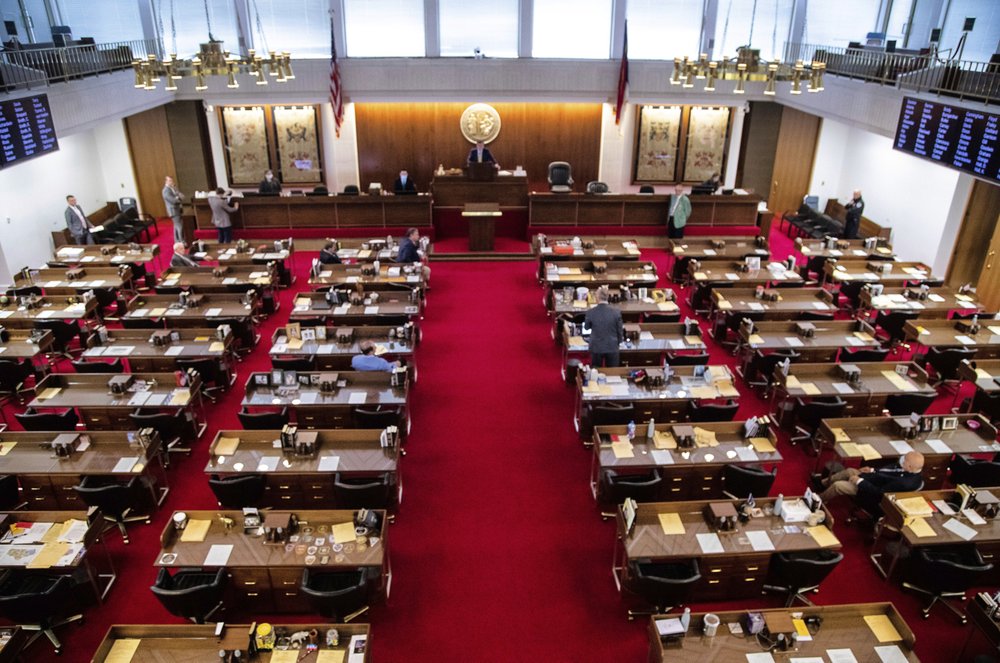A panel of North Carolina trial court judges has rejected arguments by a government reform group and local residents that a special session of the General Assembly violated the state constitution.
The case centers on a December 2016 session in which Republicans passed laws tilting the balance of power toward the legislative branch and away from Democratic Gov. Roy Cooper. Those moves came just two weeks before Cooper was sworn in after he narrowly defeated GOP Gov. Pat McCrory.
Common Cause and other individuals who sued last year said the three-day session was illegal because legislators called it so quickly — giving two hours’ notice as another session called by McCrory on hurricane relief had ended. They said GOP leaders failed to give the public the time to “instruct their representatives,” which the constitution says is a right.
In a ruling released Tuesday and dated last week, the judges wrote that the plaintiffs failed to show their constitutional rights were violated and described the difficulty of measuring when the right to instruct is violated.
“This court cannot find any support for reading this clause to include a specific right to notice of legislative action, much less any indication of the time or manner necessary for such notice that would create a justiciable standard for this court to consider,” the judges wrote.
While some who sued were unable to communicate with their legislators before bills were approved, other people were able to contact their lawmakers, according to the panel’s opinion. The bills were posted online, some opponents of the GOP legislation held a protest at the Legislative Building and legislators had email addresses, phone lines and offices where critics could lodge their complaints, he said.
“It is true that reasonable people may disagree about the appropriateness or inappropriateness of the manner of passage of the challenged legislation,” the judges wrote. “However, without a clear constitutional violation, this is a policy or political disagreement.”
The approved bills during the session subjected Cooper’s Cabinet to Senate confirmation, made appeals court elections officially partisan races and moved powers from the State Board of Education to the state schools superintendent. The content of these laws has been challenged separately in court. Other changes shifting control over administering elections and reducing the number of employees Cooper could hire already have been struck down.
Common Cause is disappointed in the ruling from Judges Wayland Sermons, Marty McGee and Todd Pomeroy and will review its appeal options, according to Bob Phillips, executive director of Common Cause North Carolina. “Regardless, we will continue to stand up for the right of North Carolinians to instruct their lawmakers and to fully participate in the legislative process,” Phillips said in a release.
Joseph Kyzer, a spokesman for House Speaker Tim Moore — one of the named defendants along with Senate leader Phil Berger and Lt. Gov. Dan Forest — said Tuesday evening the legislative leaders’ offices had yet to review the opinion and couldn’t immediately comment.
Attorneys for the GOP leaders and the state had argued they had followed the correct process to call legislators into session. The judges agreed. “This court finds the actions of the legislature are not unconstitutional” and the call of the session “conforms to the textual requirements of the North Carolina Constitution,” the ruling reads.
Lawyers for the plaintiffs also argued unsuccessfully that the legislators’ actions harm their clients’ constitutional rights to due process.
Related Stories
‹

2 North Carolina State Legislators Lose Leadership Roles Following RemarksWritten by GARY D. ROBERTSON Two North Carolina state House Republicans have lost their caucus leadership positions following recent comments directed at Democratic colleagues questioning their educational attainment and religion. Reps. Keith Kidwell and Jeff McNeely have resigned as deputy majority whips after the GOP leadership team asked them to step down, House Majority Leader […]

Bill to Reopen NC Gyms, Bars Sent to Skeptical Governor After Passing HouseThe North Carolina legislature passed another bill on Wednesday overturning parts of Gov. Roy Cooper’s executive order that keep certain businesses closed to discourage the spread of COVID-19. As with previous legislation sent to him seeking to reopen bars, Cooper is also likely to veto the latest measure, which also ends the shuttering of gyms […]

Public Can Watch NC House Floor Debate Again in PersonThe seats above the floor in the North Carolina House chamber are reopen to the public again. The House has voted to amend its operating rules, which keeps in place most of the adjustments it approved in April to protect the health of members and the public during the COVID-19 pandemic. The seats in the […]

Governor Cooper's Vetoes May Be Remembered Most in 2019Many of North Carolina Democratic Gov. Roy Cooper’s lasting achievements in 2019 stem from keeping Republican policies from ever getting implemented. During a year-end interview with The Associated Press on Wednesday, Cooper cited successes in recruiting companies and jobs to the state, reducing the number of opioid deaths and moving the state toward cleaner energy […]
![]()
NC Legislature Goes Home, Still Without Budget ResolutionThe North Carolina General Assembly went home on Thursday for a brief respite from Raleigh, still without the Republicans’ original two-year budget bill enacted and an uncertain path forward on Medicaid after nine months of legislating this year. The House and Senate adjourned its session after several hours of floor and committee debate and votes […]
![]()
North Carolina Republicans Return for Session Likely EndThe North Carolina General Assembly could soon be done wrestling with legislation this year, but that doesn’t mean they’ll pin down a broad budget law or path forward on Medicaid expansion. Lawmakers return Monday following a roughly 10-day break. Senate leader Phil Berger said his chamber will be done with regular business by Oct. 31. […]
![]()
General Assembly Confirms 3 Cooper Education Board PicksThe North Carolina General Assembly has confirmed three of Gov. Roy Cooper’s recent appointments to the State Board of Education, one year after Republican legislators voted against two of his choices. House and Senate members meeting in a rare joint floor session on Wednesday voted 140-8 to approve the appointments of J.B. Buxton of Raleigh, […]

NC Remap Won't Necessarily Produce Democratic MajoritiesNorth Carolina’s newly redrawn legislative districts are skewed less toward Republicans than the current plans, which judges rejected for political bias, but they wouldn’t necessarily guarantee Democratic majorities in 2020, redistricting experts say. The new state House and Senate district lines that the General Assembly approved this week have been sent to a three-judge panel — the same panel […]
![]()
Despite Critiques, NC Legislature on Pace to Remap on TimeFacing a deadline this week, the North Carolina legislature stayed on track to enact replacement districts for dozens of its seats on time, even as citizens critiqued the maps in a public meeting. Showing bipartisan support, the full Senate voted 38-9 on Monday evening for new chamber districts in 20 of the state’s 100 counties, most in […]
![]()
Dems Cry 'Cowardice' as GOP Overrides N Carolina Budget VetoRepublicans in control of a nearly half-empty North Carolina House chamber on Wednesday held an unexpected vote to override Gov. Roy Cooper’s veto of the state budget bill, prompting accusations of trickery and deception from Cooper and fellow Democrats. Republican leaders had spent months trying to persuade enough Democrats to meet the threshold for an […]
›






